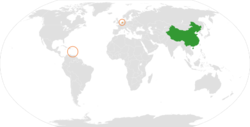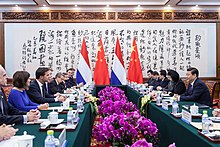China–Netherlands relations
 | |
China |
Netherlands |
|---|---|
China–Netherlands relations officially began in November 1954.[1] In May 1972, diplomatic mission was increased to ambassadorial level.[1] On 11 May 1981, the diplomatic relations was downgraded to the charge d'affaires level due to the Dutch government ratified the construction of two submarines for Taiwan by the Dutch companies. Until 1 February 1984, China and the Netherlands restored ambassadorial diplomatic relations.[1]
History
[edit]
China-Dutch relations began prior to the founding of the People's Republic of China in the 17th and 18th century when Dutch traders of the Verenigde Oostindische Compagnie (VOC) setup trading post in Canton and also in the western coast of Taiwan.[2] Johan Nieuhof's account of the first VOC embassy to Beijing in 1655–1657—and the objections against it raised by members of the Jesuit China Mission—became the influential and much-translated 1665 Embassy from the East-India Company.
PRC–Netherlands began in 1954 to establish the diplomatic relations of the charge d'affaires level. Until 18 May 1972, China upgraded to the ambassadorial level with the Netherlands.[3] In the 1980s Taiwan ordered two submarines from a Dutch shipyard which were delivered despite tremendous Chinese pressure.[4] China accused the Netherlands of colluding with American President Ronald Reagan and downgraded relations to the charge d'affaires level with the Netherlands on 11 May 1981, and threatened to do the same to the US.[5] In 1984, the Netherlands agreed not to export additional military goods in order to restore relations to the ambassadorial level.[6]
Netherlands export to China includes petrochemicals, machinery, transport equipment, food, high technology and fossil fuels.[7] China's export to the Netherlands includes computer and consumer electronics, toys and clothes.[7][8][9]
In March 2014, Chinese Communist Party general secretary Xi Jinping made the first state visit of China to the Netherlands in history.[10]
In July 2019, the UN ambassadors from 22 nations, including Netherlands, signed a joint letter to the UNHRC condemning China's mistreatment of the Uyghurs as well as its mistreatment of other minority groups, urging the Chinese government to close the Xinjiang internment camps.[11][12]
In February 2021, the Dutch House of Representatives voted to recognize the Chinese government's treatment of its Uyghur Muslim minority as genocide, becoming the first country in the European Union to do so.[13]
In February 2024, the Dutch Military Intelligence and Security Service and the General Intelligence and Security Service stated that Chinese state hackers penetrated a Dutch military network the prior year.[14] The same month, Dutch trade minister Geoffrey van Leeuwen justified export controls on ASML tools to China on the grounds that they would be used for "high-value weapons systems and weapons of mass destruction."[15] In April 2024, the Dutch Military Intelligence and Security Service stated that Chinese spies were actively targeting the Netherlands' semiconductor, aerospace and maritime industries in order to strengthen China's armed forces.[16]
In June 2024, the Dutch Ministry of Defence accused China of creating an "unsafe situation" when its fighter jets encircled Dutch frigate HNLMS Tromp in international waters in the East China Sea.[17][18] In October 2024, the Dutch National Coordinator for Security and Counterterrorism stated that Chinese state-backed cyberattacks had increasingly moved from cyberespionage to also prepare for sabotage.[19]
Resident diplomatic missions
[edit]
- China has an embassy in The Hague.
- the Netherlands has an embassy in Beijing and consulates-general in Guangzhou, Hong Kong and Shanghai.[citation needed]
See also
[edit]- Chinese people in the Netherlands
- Chinese people in Europe
- Dutch people in China
- China–European Union relations
- Marc van der Chijs, Dutch co-founder of popular Chinese video-sharing website Tudou
References
[edit]- ^ a b c "China and the Netherlands". Archived from the original on 22 June 2014. Retrieved 18 May 2016.
- ^ Author Yong Liu, (2007), The Dutch East India Company's tea trade with China, 1757–1781, Volume 6 of TANAP monographs on the history of the Asian-European interaction, BRILL, ISBN 90-04-15599-6, ISBN 978-90-04-15599-2, 277 pages, 17–89, 91–117
- ^ "China Relations with Europe". Archived from the original on 30 July 2012. Retrieved 18 May 2016.
- ^ "DUTCH SUB ON WAY TO TAIWAN". joc.com. JOC. Associated Press. Archived from the original on 3 November 2022. Retrieved 4 March 2021.
- ^ Sterba, James P. (19 January 1981). "CHINA ATTACKS U.S. ON DUTCH-TAIWAN DEAL". The New York Times. Archived from the original on 4 January 2022. Retrieved 4 March 2021.
- ^ SAITO, MARI; LEE, YIMOU; PARK, JU-MIN; KELLY, TIM; MACASKILL, ANDREW; WU, SARAH; LAGUE, DAVID. "Silent partners". Reuters. Archived from the original on 20 December 2021. Retrieved 30 November 2021.
- ^ a b "More goods exported to China, imports from China down". 29 April 2010. Archived from the original on 14 July 2014. Retrieved 18 May 2016.
- ^ "Archived copy" (PDF). Archived from the original (PDF) on 18 July 2011. Retrieved 2 July 2010.
{{cite web}}: CS1 maint: archived copy as title (link) - ^ "Imports from China rising more slowly". 11 September 2008. Archived from the original on 14 July 2014. Retrieved 18 May 2016.
- ^ "Historisch bezoek Xi aan Nederland". NOS (in Dutch). 22 March 2014. Archived from the original on 1 July 2014. Retrieved 22 March 2014.
- ^ "Which Countries Are For or Against China's Xinjiang Policies?". The Diplomat. 15 July 2019. Archived from the original on 16 July 2019. Retrieved 17 July 2019.
- ^ "More than 20 ambassadors condemn China's treatment of Uighurs in Xinjiang". The Guardian. London. 11 July 2019. Archived from the original on 14 July 2019. Retrieved 17 July 2019.
- ^ "Dutch parliament: China's treatment of Uighurs is genocide". Reuters. 25 February 2021. Archived from the original on 4 February 2022. Retrieved 26 February 2021.
- ^ "Chinese spies hacked Dutch defence network last year - intelligence agencies". Reuters. 6 February 2024. Retrieved 6 February 2024.
- ^ Sterling, Toby (19 February 2024). "Dutch government says China seeks military advantage from ASML tools". Reuters. Retrieved 19 February 2024.
- ^ "Chinese spies target Dutch industries to strengthen military, intelligence agency says". Reuters. 18 April 2024. Retrieved 18 April 2024.
- ^ "Chinese jets circle Dutch ship in East China Sea". Deutsche Welle. 8 June 2024. Retrieved 9 June 2024.
- ^ "China warns against Dutch naval 'intrusion' in East China Sea". South China Morning Post. 11 June 2024. Retrieved 15 June 2024.
- ^ Lau, Stuart; Kine, Phelim (29 October 2024). "Xi wants NATO to keep out of Asia. Kim Jong Un isn't helping". Politico. Retrieved 29 October 2024.

